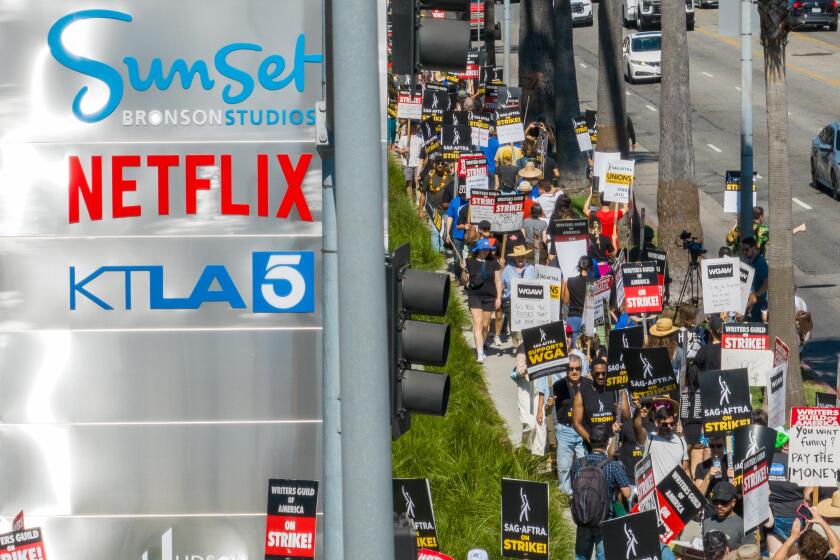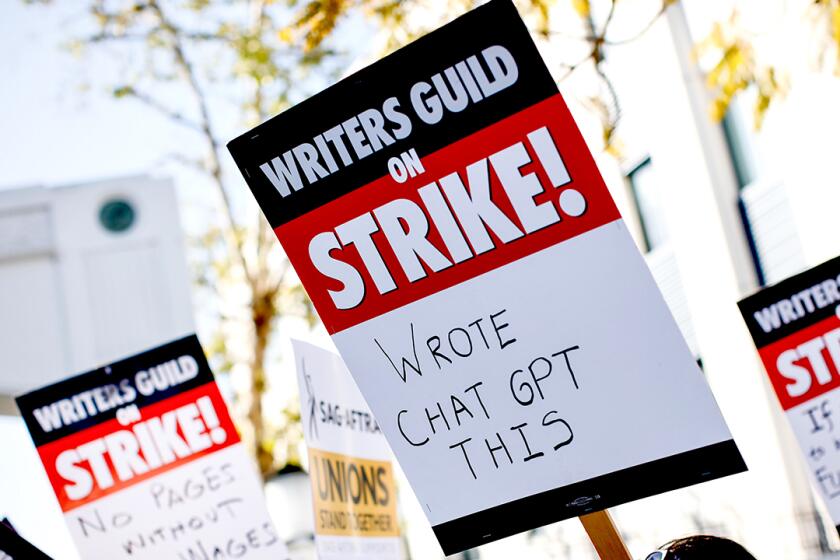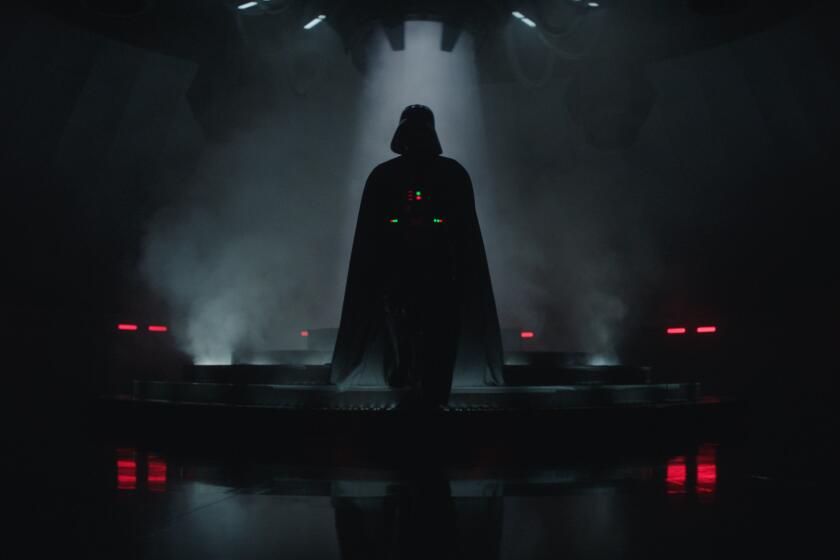What Stephen King — and nearly everyone else — gets wrong about AI and the Luddites

- Share via
Like millions of people on this fine planet, I count myself a lifelong Stephen King fan.
In fact, King is one of the reasons I do what I do. As a kid, I always liked reading, but it was discovering works of science fiction like “Dune” and King’s mind-bending novels that demonstrated how powerful and transporting books could be. As a teenager, I wolfed down tomes such as “Salem’s Lot,” “The Green Mile,” “Firestarter” and “Carrie.”
I wrote my own sci-fi stories, and privately mused about making a pilgrimage to Maine, where King lived — it might as well have been in Mid-World, on the other side of the country from my suburb in Sacramento — to see if he would take me in as an apprentice. Years later, as I was fumbling down the road to becoming a working writer, I found wisdom, and hope, in his nonfiction treatise “On Writing.”
Which is why it pained me to see King mischaracterize a group that I’ve grown quite close to in recent the years — the Luddites — and to argue that it’s folly to resist technologies such as generative AI.
Last week, the Atlantic published a story that revealed one of the major large language models (LLMs) — the systems that make generative AI possible — had been trained on tens of thousands of pirated books. Meta’s LLaMa had been fed some 170,000 copyrighted works of fiction and nonfiction; the Atlantic named Michael Pollan, Zadie Smith, Margaret Atwood and Sarah Silverman as among the authors whose works had been used, without their knowledge or permission, to train the AI.
“The future promised by AI is written with stolen words,” the Atlantic wrote.
Many writers were angry and exasperated. “Generative AI programs are plagiarism machines and whatever you produce with them will be composed of other people’s copyrighted work,” the author Cole Haddon wrote on X, the platform formerly known as Twitter.
The news landed in the wake of months of complaints and anxieties among authors and writers. Silverman, for one, had already filed a headline-grabbing lawsuit against OpenAI and Meta because their AI systems were able to emulate her 2010 book, and were “likely” trained on a copy without her consent; now she has proof that was indeed the case. Meanwhile, 10,000 writers have signed an open letter put forward by the Authors Guild, imploring AI companies to obtain permission before ingesting books, and to compensate authors when they do so.
Further backlash from writers against the AI services that are relying on their work to make them tens of millions of dollars a month was to be expected.
But there was one notable figure who didn’t share the outrage — though he did share the anxiety. Because also included in that corpus of AI training data were the books of Stephen King.
Inspired by the success of Netflix, Hollywood studios pursued Silicon Valley-style hypergrowth with tactics borrowed from the likes of Uber and Lyft.
King responded to the news that his work had been ingested by the AI companies in a short piece that the Atlantic also published shortly after. The gist seems to be that new technologies can be scary, but humans learn to adapt, and even embrace them, and that it would be folly to resist the advancing tides of technology when it comes to generative AI.
Characteristic of King, it’s evocative and direct, clever and sharply written. He’s primarily concerned with the question of whether the output of a generative AI can be considered truly creative; whether ChatGPT might yield art surprising enough to rival a human’s. “Creativity can’t happen without sentience, and there are now arguments that some AIs are indeed sentient,” he writes, and if that’s true, “then creativity might be possible.”
Then there’s the section that caught my eye:
“I view this possibility with a certain dreadful fascination. Would I forbid the teaching (if that is the word) of my stories to computers? Not even if I could. I might as well be King Canute, forbidding the tide to come in. Or a Luddite trying to stop industrial progress by hammering a steam loom to pieces.”
Opposing generative AI, he says, is like opposing the tide coming in — resistance is futile, and makes you a Luddite.
Now, as it happens I’ve spent the last three years or so researching and writing a book about the Luddites, and why their struggle remains deeply relevant today. And the single biggest misconception about the Luddites is the one King hits on here — that they were trying to stop industrial progress.
They were not opposed to progress, and certainly not to technology; most were skilled technicians themselves, who spent their days working on machines at home or in small shops. It is true that the Luddites hammered certain machines to pieces, but it wasn’t technology itself they were protesting — it was the bosses that were using those machines to cut their pay and shepherd them into factories.
There was nothing preordained that held that industrial progress had to take this shape — we can, with some ease, imagine a future in which technology advanced accordingly, but the cloth workers benefited more equally from the new industrial machinery, hosting it in their small shops, or sharing in the gains it produced more equally, rather than those gains accruing to a handful of factory bosses, who maximized profits and immiserated their workers.
Which brings me to King’s essay. The point here is not to “well, actually” Stephen goddamned King, or to try to embarrass him, but to point out why it’s so important that we understand the distinction between the myth of the Luddites — ignoramuses who smashed machines because they didn’t understand them — and the true Luddites: skilled, proud cloth workers who understood all too well how machinery was being deployed against them, and fought back. And the sentiment that generative AI is somehow inevitable is hardly relegated to bestselling novelists; it may be the predominant attitude I run into in conversations about the technology.
The reason that, 200 years later, so many creative workers are angry and unnerved by AI is not that they fear it will become so good, so powerful that they may as well up and quit writing, drawing, or acting. It’s that, like the Luddites, they are painfully aware how bosses will use AI against them. To most working authors (and artists, screenwriters, illustrators, and so on) the fear over AI is not philosophical; it is economic, and it is existential.
Artists, journalists and screenwriters are leading the fight against employers who would seek to replace them with the products of ChatGPT and other generative AI software.
In “On Writing,” one of the most resonant sections describes King’s road to becoming a published novelist: toiling in obscurity, teaching college classes, publishing short stories in horror magazines, and, eventually, hitting the jackpot after his wife rescues an early manuscript of “Carrie” from the trash can. A publisher gives him a $2,500 advance for the hardcover, and it gets picked up for an eye-watering $400,000 advance for the paperback (which King split with his original publisher 50/50).
The industry has already changed such that almost no one can make any money selling short stories at all, and such life-changing advances, rare then, are all but impossible now for untested genre authors. Generative AI stands to further erase revenue streams for working creatives who are struggling to break into the game, making the odds of a future Stephen King finding success all the more slim.
Corporate clients are turning to generative AI for in-house creative work, firms are deploying ChatGPT for copywriting, and movie studios have made it clear they want the right to use it to make scripts. Some of that stuff isn’t necessarily creative writing, but as the science fiction writer Ted Chiang has pointed out, it’s eliminating crucial opportunities for writers to practice their craft.
Amid a pair of Hollywood strikes that have found screenwriters and actors questioning the rise of artificial intelligence, studios and streaming companies are bulking up on AI staff.
Meanwhile, self-published authors now have to contend with an onslaught of AI-generated content on Amazon, and certain sci-fi magazines have had to close submissions altogether — they were getting spammed with too many AI creations.
All of these make for pretty good reasons to oppose generative AI, or to oppose the way that it’s being used by corporations right now — it’s less about the technology, but the ends to which it is being put, and the livelihoods it’s threatening as a result.
Before they took up their hammers, those who would become Luddites lobbied for minimum wages, machinery taxes, and pauses on development — and were ignored. When they did finally rise up to smash the machines of their exploitation, they were thunderous and popular on a level equaled only by Robin Hood. It took the full might of the state and a domestic occupation to put the Luddites down — and to slander their name in history as backwards-looking dummies.
Things are different now, of course; unionization was illegal back then, and England was not yet a democracy. We have better options, and a real shot at having a say in the way that technologies like generative AI shape the way we live and work.
In King’s piece, he lists two poets whose work the generative AI isn’t yet up to imitating; one is William Blake. Among Blake’s most famous poems is ”And did those feet in ancient time,” which contains his most-quoted lines:
And was Jerusalem builded here,
Among these dark Satanic Mills?
That poem was published in 1808, just three years before the Luddite rebellion took shape. Blake was lamenting the rise of the machine-filled factory, too, because he saw the way that it stood to blight communities and immiserate workers.
I was fortunate enough to be able to follow a path staked out by one of my first author heroes, to pay the bills with odd writing jobs on the way to becoming a full-time human text generator. King’s points engaging with the abilities of the technology are good ones. I’m just humbly asking that he return to the source material of one of his favorite poets, and reconsider why it was that the Luddites — of 200 years ago, and of now — were so moved to break those machines.
- Share via
Watch L.A. Times Today at 7 p.m. on Spectrum News 1 on Channel 1 or live stream on the Spectrum News App. Palos Verdes Peninsula and Orange County viewers can watch on Cox Systems on channel 99.











